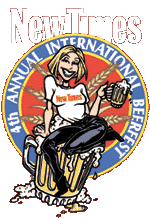
 Beer the beverage of choice for the regular guy on the silver
screen
Beer the beverage of choice for the regular guy on the silver
screenBy Kihm Winship
Beer has a history as the drink of the common man. When filmmakers want us to think of a character as "one of us," that character often drinks beer. And if one of the film's central themes is class conflict, you can be sure there's a snooty wine drinker on the horizon, and worlds are about to collide.
Consider The Adventures of Robin Hood (1938), wherein the evil Prince John (Claude Rains) drinks wine from golden goblets in a Norman castle and plots murder. Meanwhile, his good-hearted brother, King Richard the Lion Hearted (Ian Hunter), drinks English ale from a pewter mug in a Saxon inn.
Another wine-drinking noble is Prince Karl (Edmund Purdom), The Student Prince (1954), whose elders think he could use a little loosening up, so he is packed off to Heidelberg to mingle with his inferiors. This is a Hollywood Heidelberg, so the results are immediate. After draining one tall stein, he takes the lead in singing "Drink, Drink, Drink" (with the voice of Mario Lanza!) and falls in love with Kathie the barmaid (Ann Blyth), who teaches him to eat kraut and knockwurst. What a transformation! Sadly it's only temporary; the royal whelp abandons the barmaid for the good of his kingdom and returns to wine. But we are asked to believe that his fling with lager imbued him with at least a splash of humanity.
In The Band Wagon (1953), Tony Hunter (Fred Astaire) is royalty of another kind, an actor whose star has fallen to the point where he finds himself in a dreadful musical version of Faust. After the first out-of-town performance, Hunter appears at a formal champagne celebration arranged for the show's tuxedo- and fur-clad backers; they, however, have already fled the specter of failure and caught the late train for Manhattan. Alone and bored, the star seeks out the chorus kids. He finds them in a hotel room, sitting on the floor and drinking beer out of fat, brown quart bottles. Casting aside his pretension, Hunter joins the show's writers (played by Nanette Fabray and Oscar Levant) in a tune called "More Beer" with lyrics like, "How I love a glass of beerŠ more beer! Beer goes very good with beerŠ more beer!" The song is sung in counterpoint with "I Love Louisa" and succeeds in giving them all the spark they need to save the show without the help of the wealthy and powerful.
In Bye Bye Birdie(1963), youth and age collide as Elvis-like pop star Conrad Birdie (Jesse Pearson) parks his motorcycle in an upper-middle-class living room and opens a well-shaken can of beer. The resultant flying rope of foam pulls a whoop of horror from the homeowner, Harry McAfee, played exquisitely by Paul Lynde.
Frank M. Bland, proprietor of the Web's largest Marx Brothers site, (www.whyaduck.com), cites another class clash in A Night at the Opera (1935). When the aristocratic singer Lasparri is knocked cold by his dresser, Tomasso (Harpo), two bystanders, Otis B. Driftwood (Groucho) and Fiorello (Chico), each put a foot on the fallen body as if it were a brass rail. Groucho looks straight ahead and says, "Two beers, bartender." To which Chico adds, "I'll have two beers, too." It is the triumph of the common man.
The common man, however, is not always pictured as a noble conqueror. Alas, beer is often brought in to show that a character is rude, crude, or stupid, as in "He eats beer and cheese balls for breakfast," a line from Rob Reiner's The Sure Thing (1985).
It's beer on ice in The Cutting Edge (1992), with a plot that pairs a figure skater with a hockey player in an effort to win Olympic pairs skating gold. Things do not begin well. The hockey player is told by his new partner, "I'm sure I don't do anything you would find exciting. I don't open beer bottles with my toes; I don't sit around and count what's left of my teeth; hey, I don't even enjoy a good tractor pull."
In Heroes (1977), beer gets ugly when an addled but well-meaning Vietnam veteran (Henry Winkler) asks for a Dr. Brown's Cel-Ray at a roadhouse and is fallen upon by beer-swilling rednecks, one of whom smashes a beer bottle to use as a weapon. In Blue Velvet (1986), director David Lynch plumbs new depths with the help of beer and brand loyalty. His innocent hero, Jeffrey (Kyle MacLaughlin), comes home from college to care for his ailing father and is drawn into the world of a local lowlife, Frank Booth, played at full throttle by Dennis Hopper. Kidnapped and taken for a joy ride, the lad is asked what kind of beer he drinks. He softly replies, "Heineken." In a direct and incisive critique of those who aspire to shed the blue collar, Booth screams, "Heineken? Fuck that shit! Pabst Blue Ribbon!"
In the same film, Lynch uses brand preference to make a different point with far more subtlety. Jeffrey is on a date with Sandy (Laura Dern), a high-school girl whose father is a police detective. "My dad drinks Bud," she says. "King of Beers," Jeffrey replies, solemnly highlighting the images of authority and conformity that are the foundations of the detective's life.
Clearly beer's future in the movies, whether on screen or in the audience, is bright. And now, let's roll the credits and get on with the next feature.
General Information
| Beer Descriptions
| Participating Restaurants
|
Beer in Film | newtimesbpb.com